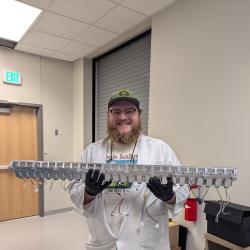Physics' Ellen Williams Confirmed as Head of ARPA-E
Distinguished University Professor Ellen Williams was confirmed by the U.S. Senate on Dec. 8, 2014, as the new director of the Advanced Research Projects Agency-Energy (ARPA-E). President Obama nominated Williams in November 2013 to direct the agency, which was launched with bipartisan support in 2009 to advance high-potential, high-impact energy technologies that are too early in development for private-sector investment.
"ARPA-E is central to the Department's advancement of energy technology innovation, and Ellen Williams will provide outstanding leadership based upon her combination of world class research in condensed matter physics and insight into how technology impacts the energy marketplace," said U.S. Department of Energy (DOE) Secretary Ernest Moniz in a release. "I'm excited to work with Ellen on expanding the scope and impact of ARPA-E."
According to the DOE press release, Williams, as Director of ARPA-E, will ensure that the technologies assisted through ARPA-E will help change the energy landscape and better meet the nations changing energy needs.
“We are delighted at the news of Prof. Williams’ confirmation,” said Patrick O’Shea, vice president and chief research officer of the University of Maryland. “Ellen has had an extraordinarily accomplished career as an educator and researcher in surface science and nanotechnology, which has prepared her well for her new position.”
Prior to her new DOE appointment, Williams was chief scientist for BP, a position she had held since 2010. She is currently on a leave of absence from UMD where she is a Distinguished University Professor in the Department of Physics and the Institute for Physical Science and Technology.
Williams came to UMD in 1981 for a postdoctoral fellowship and became a full professor in 1991. At Maryland, she pioneered the use of very powerful electron scanning, tunneling microscopes to study the surface of materials like silicon at the atomic level. In 1996, Williams founded the University of Maryland Materials Research Science and Engineering Center, serving as its director until 2009. She was elected to the National Academy of Sciences (NAS) in 2005 and is a Fellow of the American Academy of Arts and Sciences.
Williams has served on the board of reviewing editors of Science Magazine since 2003. She also has participated in technical assessments for the Defense Advanced Research Projects Agency, the Department of Defense, National Nuclear Security Administration and the Department of Energy.
As a member of the Congressional Commission on the Strategic Posture of the United States, Williams co-authored the 2009 final report titled “America’s Strategic Posture,” which provided over 100 findings and recommendations on critical issues related to the U.S. nuclear strategy.
She received her bachelor's degree in chemistry from Michigan State University in 1976 and her Ph.D. in chemistry from the California Institute of Technology in 1981.
Read a profile of Williams in the Proceedings of the National Academy of Sciences or listen to her talk about what inspired her to go into science in an NAS podcast.
Media Relations Contact: Abby Robinson, 301-405-5845, abbyr@umd.edu
University of Maryland
College of Computer, Mathematical, and Natural Sciences
2300 Symons Hall
College Park, MD 20742
www.cmns.umd.edu
@UMDscience
About the College of Computer, Mathematical, and Natural Sciences
The College of Computer, Mathematical, and Natural Sciences at the University of Maryland educates more than 7,000 future scientific leaders in its undergraduate and graduate programs each year. The college's 10 departments and more than a dozen interdisciplinary research centers foster scientific discovery with annual sponsored research funding exceeding $150 million.







